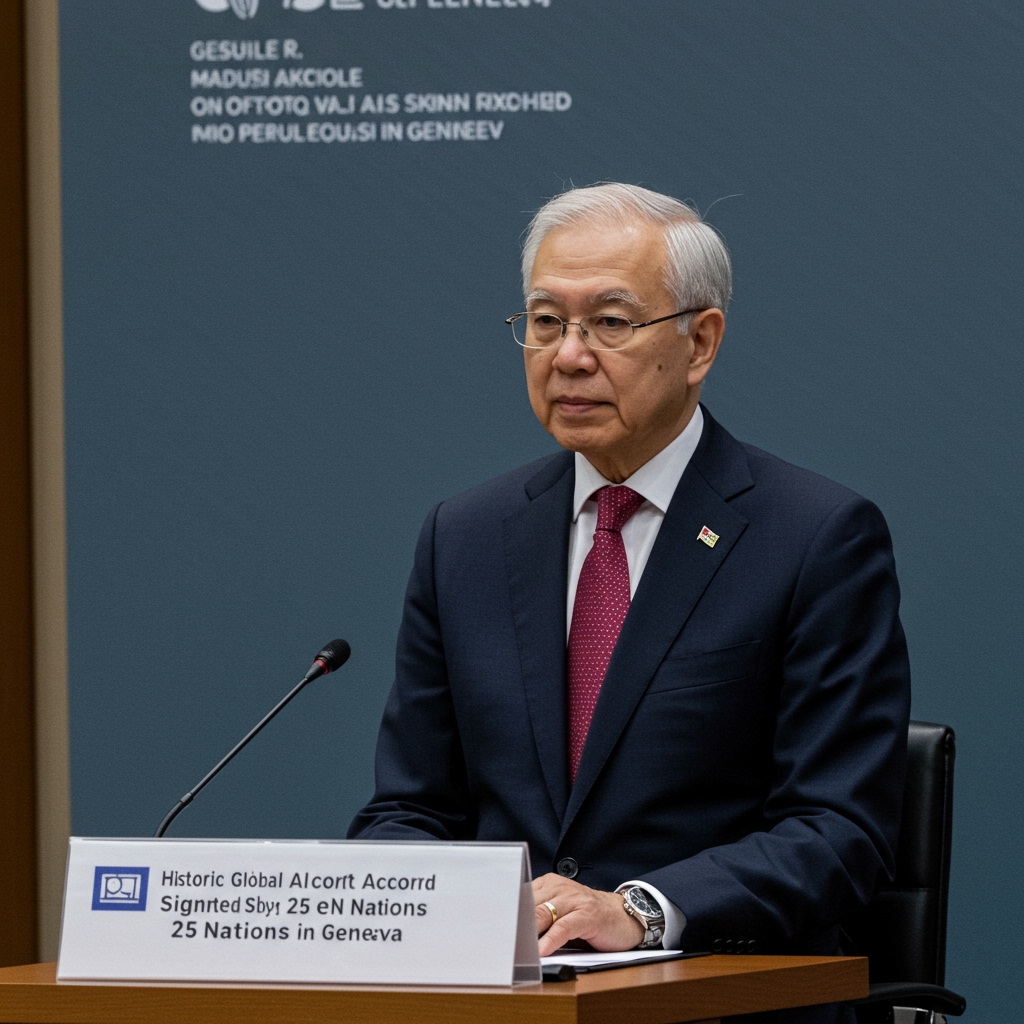Historic Global AI Accord Signed in Geneva
In a landmark development for the future of artificial intelligence governance, representatives from twenty-five major nations gathered in Geneva on January 10, 2025, to finalize and sign the Global AI Stability and Governance Accord (GASGA). This unprecedented agreement marks the first comprehensive international framework dedicated to addressing the multifaceted challenges posed by advanced AI technologies. Among the key signatories were global powerhouses including the United States, various European Union member states, China, India, and Japan, representing a significant portion of the world’s AI research, development, and economic activity. The accord, hailed by international observers as a pivotal moment, establishes a cooperative structure aimed at ensuring the safe, secure, and responsible deployment of artificial intelligence on a global scale.
Addressing Existential Risks and Misinformation
A core tenet of the GASGA is its focus on mitigating potential existential risks associated with highly advanced AI systems. The accord acknowledges the rapid pace of AI development and the potential for unforeseen consequences, committing signatories to collaborative efforts to understand and manage these risks. This includes joint research initiatives aimed at developing methods for AI safety alignment, robust testing protocols, and mechanisms for monitoring potentially dangerous capabilities as AI models become more sophisticated. Furthermore, the agreement places a strong emphasis on preventing the misuse of advanced AI models, particularly in the realm of disinformation. Recognizing the threat AI-generated fake content poses to democratic processes and societal stability, signatory nations have committed to sharing best practices and developing strategies to counter AI-driven manipulation and propaganda.
Guidelines for Autonomous Weapons Systems
The GASGA also ventures into the complex and sensitive area of autonomous weapons systems. While not a complete ban, the accord sets initial guidelines for the development and deployment of such technologies. These guidelines emphasize the need for meaningful human control over critical decisions, particularly those involving the application of force. The agreement encourages dialogue and cooperation among member states to establish clearer norms and potentially more stringent regulations on lethal autonomous weapons in the future, reflecting a shared concern about the ethical and humanitarian implications of fully autonomous warfare.
Commitments to Joint Research and Information Sharing
A cornerstone of the Global AI Stability and Governance Accord is the commitment to fostering a culture of transparency and cooperation among signatory nations. The pact mandates participation in joint research initiatives focused on AI safety, security, and risk assessment. This collaborative research is intended to accelerate the development of global standards and best practices. Equally important is the commitment to rapid information sharing on AI vulnerabilities. Recognizing that flaws or unexpected behaviors in advanced AI systems could have far-reaching impacts, the accord establishes channels for signatories to quickly communicate potential risks, security breaches, or dangerous capabilities discovered in AI models. This information-sharing mechanism is designed to enable a coordinated global response to emerging threats.
Establishing National Regulatory Bodies
To ensure the principles and commitments outlined in the GASGA are effectively implemented, each signatory nation has committed to establishing national regulatory bodies or designating existing ones that are aligned with the accord’s principles. These national bodies will be responsible for overseeing AI development and deployment within their borders, developing national policies consistent with the global framework, and participating in the international cooperative mechanisms established by the accord. Signatories have set an ambitious deadline for this critical step, pledging to have these aligned national regulatory structures in place by September 1, 2025. This commitment underscores the urgency with which participating nations view the need for robust domestic governance frameworks.
Global Endorsement and Effective Date
The significance of the Global AI Stability and Governance Accord was underscored by the endorsement from the highest levels of international leadership. UN Secretary-General António Guterres lauded the agreement, describing it as a “critical step for humanity’s future“. His remarks highlight the global recognition of the potential transformative, yet risky, nature of artificial intelligence and the imperative for international cooperation to guide its trajectory responsibly. Following the signing in Geneva, the accord is now subject to ratification processes within each of the twenty-five signatory nations. Provided these ratification processes proceed as anticipated, the GASGA is scheduled to officially take effect on April 1, 2025, ushering in a new era of coordinated global AI governance. The successful negotiation and signing of this accord represent a rare moment of multilateral consensus on a complex future-defining technology, setting a precedent for international cooperation in navigating the opportunities and challenges of the AI age.





